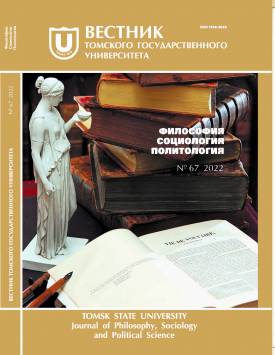Images of youth political leaders in the consciousness of Russian youth
In the article we present the analysis of the perception of six youth political leaders: A.P. Metelev, O.N. Zanko (Amelchenkova), M.V. Voropaeva, Yu.V. Ogloblina, V.M. Vlasov, D.A. Davydov, who come from youth politics and who continue their careers in public administration and public policy, through the methods of political psychology. The objectives of the study are to identify the personal and professional potential of contemporary young politicians, the general mood of young people towards this cohort, and to provide a comprehensive study of the youth political leadership phenomenon in the contemporary Russian context. The conceptual research model is based on the understanding of the image of a politician as a complex mental construct, reflecting the real characteristics of politicians and expectations towards them. Due to the unexplored nature of the phenomenon, the study presents an analysis of a set of parameters: leaders’ origin, the potential electorate’s attitude to them, and their professional path. The empirical research basis is represented by focused interviews with young people aged 18 to 35 (n = 356) with projective techniques. Based on the empirical data analysis, we revealed some peculiarities of the perception of youth political leaders: the parameters of attractiveness, strength and activity at the rational and unconscious levels of perception are expressed heterogeneously and often do not correlate with each other. The motivational profiles of the politicians are dominated by such motives as “power for ambition” and “power for action”, which seems quite justified for professional politicians. Images of the politicians are characterized by ambivalence or uncertainty, even though the study was conducted during the peak of image activity - on the eve of the election to the State Duma and after it. The absence of a direct positive correlation between the respondents’ young age and their perception of youth leaders deserves particular attention as well. This is indicated by the respondents’ ignorance about their activities and views on the rational level, and by their perception that young politicians are “immature for adult politics” on the unconscious level. Nevertheless, some leaders have indicators of attractiveness, strength and activity, which are favorable for a politician image at the unconscious level of perception. The results of the study suggest that youth leaders have potential in the form of electoral attractiveness. At the same time, perception incongruence on different levels gives reason to speak about the need to work on the formation of youth political leaders’ images and their positioning in the public policy space. The authors declare no conflicts of interests.
Keywords
political leadership, youth political leader, image of politician, political perception, youth, youth politicsAuthors
| Name | Organization | |
| Selezneva Antonina V. | Lomonosov Moscow State University | ntonina@mail.ru |
| Bozhedomova Arina L. | Lomonosov Moscow State University | arina_bozh@bk.ru |
| Lukanina Ekaterina V. | Lomonosov Moscow State University | lukanina_99@mail.ru |
References

Images of youth political leaders in the consciousness of Russian youth | Tomsk State University Journal of Philosophy, Sociology and Political Science. 2022. № 67. DOI: 10.17223/1998863X/67/17
